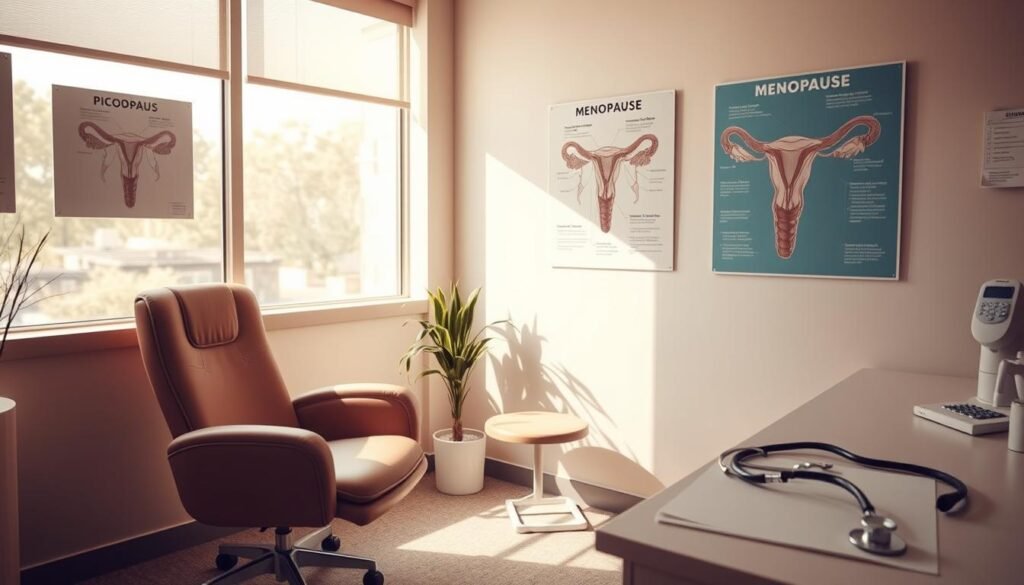Did you know about 8% to 13% of women in their reproductive years have Polycystic Ovary Syndrome (PCOS)? Yet, around 70% of them go undiagnosed globally. This fact highlights the complex and widespread nature of PCOS. As women approach menopause, it’s vital to understand how PCOS and menopause symptoms intersect. This knowledge helps maintain health and well-being.
Hormonal shifts during menopause can change PCOS symptoms, bringing new challenges. Understanding these changes is key to managing both conditions effectively. It empowers women to take charge of their health.
Key Takeaways
- PCOS affects 8-13% of reproductive-aged women and is often undiagnosed.
- Menopause brings about hormonal changes that can alter PCOS symptoms.
- Understanding the connection between PCOS and menopause is critical for women’s health.
- Managing symptoms effectively can improve quality of life during menopause.
- Awareness of shared symptoms can help in seeking appropriate medical advice.
- Adopting lifestyle changes can aid in alleviating symptoms of both conditions.
Introduction to PCOS and Menopause
Polycystic Ovary Syndrome (PCOS) affects many women with symptoms like irregular periods, weight gain, and acne. It’s crucial for women to learn about PCOS as they approach menopause. Menopause marks the end of menstrual cycles and brings big hormonal changes. For those with PCOS, menopause can be especially complex.
Women with PCOS often enter menopause about two years later than women without it. This shows how hormonal variations affect their lives. Understanding these differences is key, especially for managing menopause. Mood swings and sleep issues can overlap with menopause, making diagnosis and treatment tough.
Handling these hormonal shifts needs balance through lifestyle, doctor’s advice, and sometimes treatments. Healthy eating, exercising, and good sleep can ease PCOS and menopause symptoms. Moreover, women with PCOS face a higher risk for diseases like diabetes and heart issues after menopause.
For successful navigation through these challenges, consulting healthcare providers is vital. Women can also find helpful tips in resources like this guide on managing PCOS into menopause. Knowing about hormonal changes and their impacts can help women lead healthier lives.
Understanding PCOS: A Recap
Polycystic Ovary Syndrome (PCOS) affects 5 to 10 percent of women at childbearing age. It results from hormonal imbalances. Irregular periods, excess hair, and ovarian cysts are common signs. Recognizing these symptoms is crucial for understanding what is PCOS and its impact on life and health.
What is Polycystic Ovary Syndrome?
Up to 27 percent of women during their childbearing years face PCOS. It can cause irregular menstrual cycles, often fewer than eight a year. Many women, about 70 percent with PCOS, are undiagnosed. This condition often leads to insulin resistance, affecting over 70 percent of those with PCOS. For more insight, check the World Health Organization research.
Common Symptoms of PCOS
The common symptoms of PCOS include:
- Irregular periods or absence of menstruation
- Excessive hair growth (hirsutism)
- Ovarian cysts detected via ultrasound
- Acne and oily skin
- Weight gain or difficulty losing weight
- Dark patches of skin
These symptoms drastically affect daily life, often leading to anxiety or depression. Trouble conceiving is a frequent cause for diagnosis, underlining the need for better awareness. To manage PCOS and learn more, visit Sparkle Your Serenity.
https://www.youtube.com/watch?v=FsNKyKS7M_s
Transitioning into Menopause
The journey into menopause is a big change in a woman’s life. It helps to know what menopause is and the changes it brings. This time means the end of being able to have children, with periods stopping and big shifts in hormones. Many women face a variety of symptoms with the start of menopause. These can impact their health and happiness.
What is Menopause?
Menopause is when a woman’s ovaries stop working, a natural part of getting older. It brings many physical and emotional changes. Most women in the U.S. experience it around age 51. It comes after perimenopause, which often starts in the late 40s. Changes in estrogen and progesterone levels can cause symptoms. These include hot flashes, mood changes, and differences in sexual function.
A Typical Age for Menopause Onset
Women usually reach menopause around 51 years old. But, it can start earlier or later for some. Women with PCOS might go through menopause about four years later than others. The perimenopause stage can last around five years, leading to irregular periods and symptoms. Knowing these key points helps in managing and understanding menopause better.
Changes in Hormonal Levels during Menopause
During menopause, women go through hormonal changes. These include less estrogen and progesterone. Such changes lead to symptoms like hot flashes, mood swings, and trouble sleeping. Women with Polycystic Ovary Syndrome (PCOS) may have a tougher time due to these hormonal shifts.
In the United States, menopause usually happens at about 51 years of age. But, women with PCOS often experience it two years later. This means they stay in their reproductive years longer. Research shows that women with PCOS face various risks after menopause. This includes insulin resistance, type 2 diabetes, and heart disease.
Lifestyle choices play a big role. Regular exercise helps manage symptoms of both PCOS and menopause. If you’re trying to manage your weight, losing 5% to 10% of body weight can make a big difference in symptoms.
A balanced lifestyle helps a lot. This means eating well, staying active, and getting good sleep. Taking care of yourself this way eases hormone-related symptoms. It also boosts your overall health.
| Aspect | Impact on Hormonal Changes | Recommendations for Management |
|---|---|---|
| Estrogen Levels | Decrease leading to hot flashes and mood swings | Consider hormone therapy post-consultation |
| Progesterone Levels | Significantly drop, affecting menstrual cycles | Track menstrual patterns for better understanding |
| Androgen Hormones | May remain elevated in those with PCOS | Engage in lifestyle adjustments for better balance |
| Weight Management | Increased risk for overweight individuals | Implement a balanced diet and regular exercise |
Changes in PCOS Symptoms and Menopause: What You Need to Know
Understanding the differences between PCOS and menopause symptoms is key. Women with PCOS often enter menopause about four years later than those without it. This timing can bring unique challenges.
How PCOS Symptoms Change during Menopause
As menopause nears, changes in PCOS symptoms can be significant. Some may welcome relief from irregular periods. Others, however, might face new challenges. The issue of increased androgens (hyperandrogenism) can continue, affecting energy and skin health.
Shared Symptoms of PCOS and Menopause
PCOS and menopause share many symptoms, which complicates diagnosis and treatment. Weight gain, mood swings, and sleep problems are common to both. It’s crucial to find personalized management strategies. If lifestyle changes fall short, seeing a healthcare provider is advisable for tailored advice.
About one in ten women suffer from PCOS, and 70% remain undiagnosed. Recognizing how these conditions intersect, especially during menopause, is vital. For more on managing PCOS and menopause, visit this informative site at balance-menopause.com.
| Symptom | PCOS | Menopause |
|---|---|---|
| Weight Gain | Common | Common |
| Mood Changes | Present | Present |
| Irregular Periods | Common | Can occur during transition |
| Hyperandrogenism | Common | May persist |
| Skin Issues | Common | Occasional |
Navigating the complexities of PCOS and menopause helps in effective health management. It guides women through important life changes.
The Connection between PCOS and Menopause
The link between PCOS and menopause is a key topic for many women. As a woman transitions through menopause, she may see her PCOS symptoms continue. This persistence helps us understand what women with polycystic ovarian syndrome go through during this change.
Why Does PCOS Persist into Menopause?
Women with PCOS often enter menopause about two years later than others. This delay is linked to PCOS-related hormonal changes. Even as reproductive hormones decrease, higher androgen levels may remain. This is because adrenal glands can still make up to 50% of testosterone. These ongoing hormonal issues can make symptoms like insulin resistance and weight gain worse. They also increase risks for heart problems.
Impact of Hormonal Changes on PCOS Symptoms
Perimenopause can last a decade, bringing symptoms like hot flashes and urinary issues. For those with PCOS, these years can be even harder. Lower estrogen levels can make PCOS symptoms more severe. This includes problems with insulin and mood swings. Studies show women with PCOS are at more risk for obesity, diabetes, and heart issues as they get older. This highlights the need for special care for women with PCOS during menopause.

| Factor | Women with PCOS | Women without PCOS |
|---|---|---|
| Average Age of Menopause | Two years later | Around 51 years |
| Risk of Insulin Resistance | Higher | Standard risk |
| Common Symptoms during Menopause | Fewer hot flashes, more hirsutism and vaginal dryness | More hot flashes, less hirsutism |
| Lifetime Risk of Obesity | Increased | Standard risk |
Risk Factors Associated with PCOS and Menopause
Women with PCOS and menopause face unique health challenges. These include metabolic changes and infertility issues. It is key to understand these risks for better health care.
Metabolic Risks After Menopause
Menopause can increase metabolic risks for women with PCOS. They may enter menopause around two years later than others. This can worsen metabolic problems. High risks of diabetes, obesity, and heart disease are linked to hormonal changes during this time. In fact, more than half of those with PCOS could have diabetes or prediabetes at menopause.
Many with PCOS have poor cholesterol profiles. These profiles show high “bad” cholesterol and low “good” cholesterol levels. This situation leads to more cardiovascular disease. Losing 5% of body weight and eating whole foods can cut these risks.
Infertility and Menopause
PCOS is a top cause of infertility in women of childbearing age. PCOS symptoms can continue to make getting pregnant hard during menopause. Many have faced hurdles in conceiving due to hormonal imbalances.
Although menopause can impact fertility, there are treatments and lifestyle changes that can help. Focusing on a healthy diet, regular workout, and hormone checks can improve life quality in this phase.
| Health Risk | Impact on Women with PCOS |
|---|---|
| Diabetes | Over 50% may be diabetic or prediabetic. |
| Heart Disease | Higher risk due to poor cholesterol levels. |
| Infertility | Common in individuals with PCOS; symptoms may prolong challenges during menopause. |
| Endometrial Cancer | Slightly elevated risk due to hormonal imbalances. |
Managing PCOS Symptoms during Menopause
As women reach menopause, managing PCOS symptoms becomes very important. Women with polycystic ovary syndrome (PCOS) may still have symptoms after menopause starts. It’s key to find good ways to stay well during this change.
Eating right is very important for menopause management. Women should eat lots of whole foods, vegetables, lean proteins, and healthy fats. This can help avoid weight gain, a big worry for women with PCOS near menopause. Also, adding supplements like Inofolic Alpha can help lose weight. Women have lost about 6% of their weight safely by using it.
Being active is also crucial. Exercise helps with weight and lowers the risk of heart diseases and diabetes. Women with PCOS face a higher risk of these conditions. Doing both cardio and strength training is a good idea.
Talking to health experts is key for women with PCOS. Early detection and treatment improve outcomes. Women should share symptoms like acne, pain, or irregular periods with their doctors. They should also talk about menopause problems like hot flashes and dryness.
Making lifestyle changes can really improve life during this time. By eating right, staying active, and talking openly with doctors, women can deal with PCOS symptoms during menopause well. For deeper understanding of PCOS symptoms and how to manage them, checking out health blogs is helpful.

Lifestyle Changes to Cope with PCOS and Menopause
Proactive lifestyle changes are key to managing PCOS and menopause symptoms. It’s important to follow smart dietary tips and to increase exercise. These actions boost overall health, improve hormonal balance, and help in managing weight.
Dietary Recommendations
For PCOS and menopause symptoms, a healthy diet is crucial. Key advice includes:
- Low-carb diets: Cutting carbs helps with insulin resistance, a common issue in PCOS sufferers.
- High-fiber foods: Fruits, veggies, and grains regulate hormones and boost health.
- Lean proteins: Foods like chicken, fish, and plant proteins help in keeping weight in check.
Lifestyle adjustments can reduce weight and balance hormones in women with PCOS, improving life quality.
Exercise and Physical Activity
Adding exercise to daily life brings many pluses, like better weight control and mood. People should pick activities based on what they like and can do.
- Aerobic exercise: Activities such as walking or swimming improve heart health and aid weight loss.
- Strength training: Exercises like lifting weights keep muscles strong and boost metabolism during menopause.
- Mindfulness practices: Yoga and meditation lower stress and ease PCOS and menopause symptoms.
Staying active supports a healthy body and mind. Mixing exercise types works better than dieting alone.
| Type of Activity | Benefits |
|---|---|
| Aerobic Exercises | Improves cardiovascular health, aids in weight loss |
| Strength Training | Increases muscle mass, enhances metabolism |
| Mindfulness Practices | Reduces stress levels, improves mental health |
These lifestyle shifts make a big difference during PCOS and menopause. Focusing on nutrition and active living helps manage symptoms well.
Seeking Medical Help for PCOS and Menopause
Talking openly with doctors is key for women tackling the challenges of PCOS and menopause. Getting medical advice for PCOS helps manage symptoms better and boosts health. It’s important for women to talk freely about their symptoms with a doctor. This conversation leads to the right diagnosis and care, fitting each person’s needs.
Discussing Symptoms with a Healthcare Provider
If you have PCOS symptoms like a lot of hair growth, acne, or missed periods, get advice. These symptoms can affect your health as you approach menopause. Seeing a doctor regularly helps keep track of hormone levels and insulin resistance. Acting early improves health overall.
Before a doctor’s visit, think about these tips to make the talk useful:
- Keep a symptom diary to track changes over time.
- List all medications and supplements currently taken.
- Be open about personal and family medical histories.
- Express specific concerns regarding menstrual cycles, skin changes, or weight management.
Tests for PCOS may include blood work for hormone levels and ultrasounds for ovarian cysts. Getting diagnosed right matters. It leads to treatments that target the problem. This lowers the risk of issues like high blood pressure and diabetes.

Don’t ignore your symptoms. Being proactive about seeking help for PCOS and talking to your doctor can greatly help. Knowing more and having open talks is crucial for the best health results.
Conclusion
Understanding how PCOS and menopause link is crucial for women facing these major life transitions. Around 10% of women before menopause have PCOS, affecting their life into menopause. Even as symptoms change, risks like insulin problems and heart issues stay high.
Women with a PCOS history face big health challenges. They often deal with metabolic syndrome and have a higher chance of getting hypertension and heart disease after menopause. It’s key to use lifestyle changes and medical help early to lower these risks and improve health.
Women with PCOS face special hurdles as they reach menopause. But knowing about these issues and acting early can greatly improve their lives. It’s critical to tackle PCOS and menopause together. This empowers women to look after their health better.